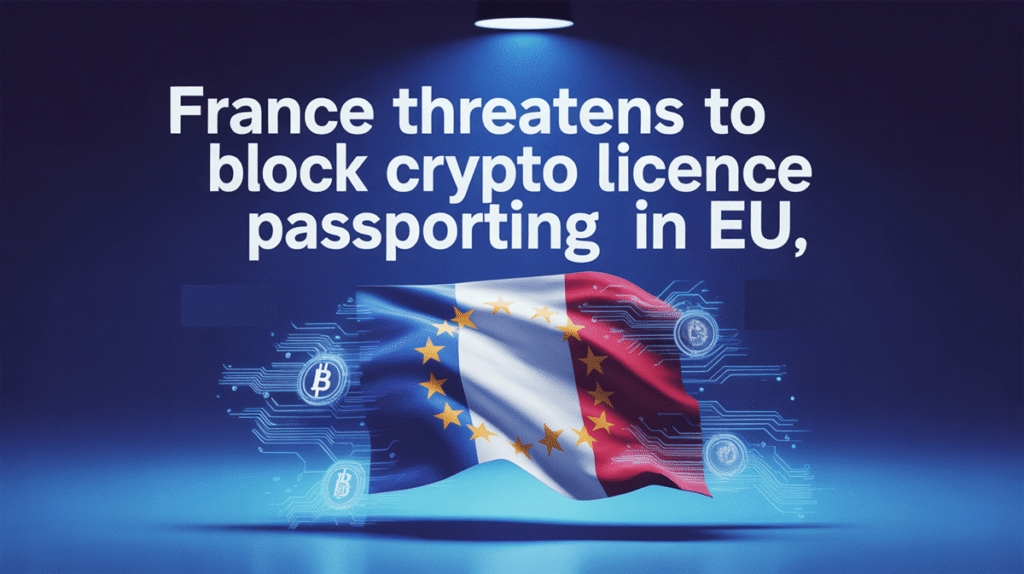Key Takeaway: AMF warns it may block crypto companies licensed in other EU countries under the MiCA passporting system.
France’s financial watchdog has issued its strongest warning yet about the European Union’s cryptocurrency regulatory framework, threatening to block firms licensed in other member states if oversight gaps in the landmark MiCA regulation persist.

Marie-Anne Barbat-Layani, president of France’s Autorité des Marchés Financiers (AMF), told Reuters on Monday that France “does not exclude the possibility of refusing the EU passport” for crypto companies seeking to operate domestically under licenses obtained in more lenient jurisdictions.
The warning represents the most significant challenge to the Markets in Crypto-Assets (MiCA) regulation’s core principle of creating a unified EU crypto market since the legislation became fully operational in December 2024.
The MiCA Passporting System Under Fire
What Is Crypto Passporting?
MiCA allows cryptocurrency firms to obtain licenses from individual EU member states and use them as “passports” to operate across all 27 countries in the bloc. This system was designed to create a seamless single market for digital assets across Europe.
However, the first months of implementation have revealed “major differences” in how national regulators apply the rules, according to a joint position paper released Monday by France, Italy, and Austria.
Regulatory Shopping Concerns
“Crypto platforms are doing their regulatory shopping all over Europe, trying to find a weak link that will give them a licence with fewer requirements than the others,” Barbat-Layani said, without naming specific companies.
The practice allows firms to secure easier approvals in certain jurisdictions before expanding across the EU using their passports. Luxembourg and Malta have emerged as popular destinations, with Coinbase obtaining its license through Luxembourg in June and Gemini receiving approval from Malta in August.
The ‘Atomic Weapon’ Option
France’s Nuclear Threat
Barbat-Layani described blocking crypto passports as an “atomic weapon” option that France holds “in reserve.” Such measures would force crypto companies to seek separate authorizations in each country rather than relying on the passport system.
It’s very complex legally and not a very good signal for the single market – it’s a bit like the ‘atomic weapon’ … but it’s still a possibility we hold in reserve,” she explained.
Three-Country Coalition
France is not acting alone. Italy and Austria have joined forces to call for the European Securities and Markets Authority (ESMA) to take direct supervision of major crypto firms rather than relying on national authorities.
The three countries argue that current disparities in licensing standards threaten the integrity of the EU’s crypto regulatory framework and could undermine investor protection.
ESMA Review Exposes Weaknesses
Malta Under Scrutiny
The push for stricter oversight follows an ESMA peer review published in July 2025 that criticized Malta’s Financial Services Authority for its crypto licensing process. The review found that Malta had not adequately assessed risks when granting authorization to at least one unnamed crypto company.
The ESMA review identified “material issues that were pending at the date of authorization or that have not been adequately considered at the authorization stage”.
Broader Implementation Challenges
More than 40 crypto asset service provider licenses have been issued across EU member states since December 2024, with the Netherlands and Germany leading in approvals. However, the varying standards have raised concerns about regulatory arbitrage.
Market Impact and Industry Response
Growing Sector Under Pressure
Europe’s crypto sector continues rapid growth under the new MiCA framework, but France’s threat introduces significant uncertainty. If implemented, blocking measures could fragment the EU crypto market and force companies to navigate multiple regulatory regimes.
The European Banking Authority added to regulatory pressure in August 2025 by releasing draft rules requiring EU banks to apply strict capital charges of up to 1,250% for most crypto-asset exposures.
Historical Precedent
The current dispute echoes broader debates about regulatory harmonization across the EU. Similar tensions emerged during the implementation of other financial regulations, where differences in national interpretation led to calls for more centralized supervision.
France has consistently pushed for stronger European oversight, having implemented comprehensive crypto regulations through its PSAN framework in 2019, which served as a model for parts of MiCA.
Looking Ahead
Potential Consequences
If France follows through on its threat, it could set a precedent for other EU countries to reject crypto passports, potentially unraveling one of MiCA’s key benefits. This would represent a significant setback for the EU’s goal of creating a unified digital asset market.
Path Forward
The three-country coalition is pushing for ESMA to assume direct supervision of major crypto firms, similar to how the European Central Bank supervises large banks. This approach could address regulatory shopping concerns while maintaining the single market principle.
The coming months will be crucial in determining whether EU authorities can address these regulatory gaps or whether France will deploy its “atomic weapon,” potentially reshaping Europe’s crypto landscape.
Source: Based on reporting by Reuters and official statements from the AMF, Consob, FMA, and ESMA.




